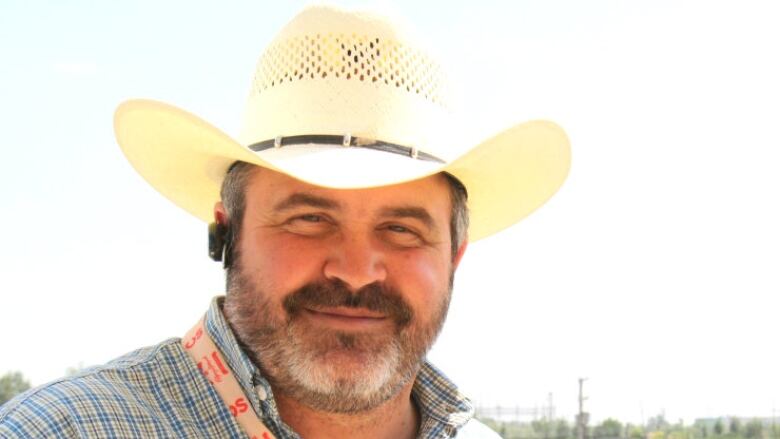Why the Certified Humane beef label might unfairly tarnish Canada cattle
It's a mistake to assume Alberta beef meets lower standards despite Earls chain's recent decision, expert says

The decision by Earls Restaurantsto stop serving Alberta beef has fired up everyonefrom the cattle industry to consumers.It's a mistake, however, to assume Alberta ranchers are less humane in their practices, says one expert who's been involved with Certified Humanelabelling in Canada and the U.S.
EdPajor, professor of animal welfare at the University of Calgary, shed some light on the topic in an interview with David Gray on CBC's CalgaryEyeopener on Friday.
Pajor whoisinternationally recognized for his research on the behaviour and welfare of food animals and rodeo animalstalked about how Alberta producers are taking steps towards humane certification labelling and branding.
- Alberta organic beef producers see opportunity as Earls opts for Certified Humane beef from U.S.
- After saying 'Earls supports terrorists,' Alberta PC board member resigns
He added the beef industry is a bit behind when it comes to the contentious Certified Humanelabel because it hasn't been part of Canadian cultureuntil recently, but he saidthe industry would eventually catch up.
DG: This move by Earls makes consumers wonder if that Alberta beef is inhumane by definition. Is it?
EP:I think Alberta producers don't really get the credit they deserve for the programs they are developing and moving forward with. We have the National Farm Animal Care Council's Code of Practice, which is brand new. We have the Feedlot Assessment Program, which is also an on-feedlot assessment that looks at the care the animals are receiving. There's also the Roundtable on Sustainable Beef. The issue here is that the programs in Canada are slightly behind in terms of timing. For example, the Feedlot Assessment Program that's coming out was only introduced in January.... So we're progressing along down the same line.

DG: What makes a piece of steak Certified Humane?
EP:Certified Humane is a third-party-verified label that is put forward by Humane Animal Care.They have their own set of standards. It's important to realize that Certified Humane is only one of numerous organizations in the United States that have third-party verification for animal care labels. Each one feels their standards are the best, feels that they offer a good service. I was involved with setting that up. I was also involved with setting up the scientific review for numerous beef codes here in Canada, as well.
DG:Earls has suggested it's offering something better than your average Alberta rancher is doing. Define "better."
EP: I don't think it's better, it's just a different program. For example, the certified program is a little more prescriptive in certain ways. For example, when it comes to antibiotic use, the certified program allows for antibiotic use for therapeutic reasons but not for being used as a growth promoter. That's very specifically identified. In the codes of practice in Alberta, that's notspecifically identified.
DG: What do you make of the noise around this and the notion of a boycott of a restaurant that's made this decision?
EP:The implication suggests that Alberta beef is somehow not being raised humanely really hits people the wrongway. It doesn't seem to be accurate, and that's probably where that response comes from.
DG: Is it more expensive to raise humane beef?
EP:By being part of that program there is going to be a cost associated to the producers. This is a labelling program that is aimed at defining a niche market and giving producers access to those consumers who are willing to pay for something that's been certified.
DG: How is it that the Alberta cattle community have fallen behind from what others in the industry are doing?
EP: Back in the late '90s/early 2000s, the issue of labelling food based on animal welfare and animal care really wasn't part of the framework of the discussion in the production of food [in Canada]. We haven't had that type of entrepreneurshiparound labelling food that way. It hasn't been part of the culture here. So it's not that they're behind or that they haven't been looking after or treating animals humanely; it has to do with having a program in place and we are marching along in that direction.

- Earls switch to U.S. meat 'a slap in the face,' Alberta Beef Producers boss says
- Earls restaurants' moveto drop Alberta beef provokes backlash
With files from The Calgary Eyeopener












_(720p).jpg)


 OFFICIAL HD MUSIC VIDEO.jpg)
.jpg)



























































































